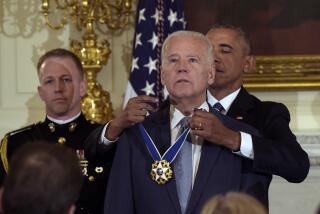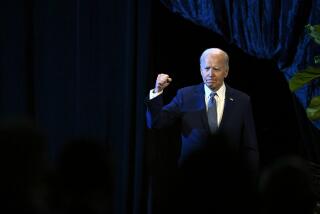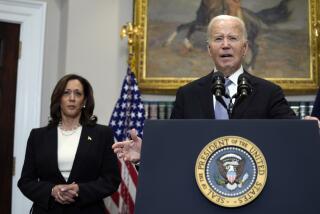Bush Enjoys Day Without Pressure but Meese Turmoil Dogs Campaign
- Share via
MADISON, Wis. — George Bush throttled back and tried to relax on the campaign trail Wednesday, his first day free of serious challenge for his party’s presidential nomination.
He was not, however, free of nagging controversy.
Here was a candidate with the luxury of turning to fresh themes of party unity and the impending general election fight--a head start of many weeks on the Democrats. This was thanks to Sen. Bob Dole’s withdrawal from the GOP contest on Tuesday.
But even in the pleasant glow of the moment, there was a familiar dark cloud following the vice president--ethical turmoil in the Reagan Administration.
In interviews with local news reporters as he campaigned in Wisconsin, the vice president stuck by the President and Atty. Gen. Edwin Meese III, but not without letting his irritation show through about the continuing inquiry into Meese’s official behavior.
“We’ve got to restore confidence in the Justice Department,” Bush said.
‘It Troubles Me’
“It seems to me the Justice Department has to be above reproach. . . . I will not prejudge the attorney general. But I will say it troubles me.”
The protest resignations of top Meese deputies--amid the continuing investigation of the attorney general’s involvement in helping a discredited defense contractor--provided the top question to dog Bush on this day. To his apparent chagrin, the vice president was caught in the present rather than being able to reach out to the future.
Bush defended Meese, but conditionally. Asked when the White House should seek the attorney general’s resignation, Bush replied: “When there’s something other than rumor and innuendo about him.
“The appearance of impropriety should not be confused with impropriety itself,” Bush added.
The abrupt resignations Tuesday of two top Justice Department officials and four aides brought into the open the internal discontent with Meese and with what has happened to the reputation of the department.
The vice president, perhaps as much in hope as from certainty, said he felt he would not suffer politically from the focus on Administration ethics.
“No, I’m not concerned it will rub off on my campaign. . . . I’ve advocated the highest standards of ethics. . . . I think the American people understand that.”
Another issue, the Iran-Contra scandal, also continued to follow the vice president.
In Washington, the congressional committees that investigated the scandal released a document that reinforced existing doubts about Bush’s contention that he did not know that Secretary of State George P. Shultz and Defense Secretary Caspar W. Weinberger were opposed to President Reagan’s secret arms sales to Iran.
The document, a 26-word handwritten agenda, summarized the points that then-National Security Adviser John M. Poindexter intended to present to Reagan and Bush at a briefing on Jan. 17, 1986.
At the briefing, Poindexter presented a proposed presidential order, or “finding,” to Reagan to keep the Iranian deals going. The final point on his handwritten agenda: “Shultz and Weinberger still recommend against.”
Bush repeatedly has said that he did not know Shultz and Weinberger opposed the arms sales at that time. Shultz, on the other hand, has said that Bush attended at least one meeting, and probably two, when he expressed strenuous objections to the sale.
The Poindexter agenda, which was first reported by the Washington Post, does not reveal whether--or how--the national security adviser actually described Shultz and Weinberger’s positions in the Jan. 17 briefing.
It was already known that Shultz and Weinberger’s opposition to the sale was on Poindexter’s agenda for the meeting. A written memorandum that he used for briefing the President notes: “The secretaries do not recommend you proceed with this plan.” That memorandum was released by the White House in November, 1986.
Bush has said that he remembers little of the January briefing--and cannot even recall that Reagan signed the finding at the session.
In between the waves of questions about developments in Washington, Bush settled into a new and unhurried campaign pace. At the very anticipation of Dole’s withdrawal, Bush strategists began lopping appearances off his schedule.
Scuttled were virtually all stops in Wisconsin, where Bush was to drop by shopping centers and the like to shake hands and provide local television with campaign backgrounds. That left him with only two stops in one day, compared to the dozen and more he once squeezed in during the height of the battle.
Bush also canceled a planned return to Wisconsin on Monday, the day before the primary.
Time for Planning
“Without a lot of tension and without a lot of hectic campaigning, we can sit down and lay out a solid plan for the period between now and the convention (in August) and also for the general election,” said Peter Teeley, communications director for the campaign.
Campaign pollster and strategist Robert Teeter said even with a reduced schedule Bush would remain on the stump enough to visit all states where primaries are still pending, including California.
“This will give us a chance to pace ourselves, but we’re not going to lay back,” Teeter said.
Because Dole’s agonizing withdrawal was so many days in the making, the Bush campaign has already had time to ponder its next problem--how to keep the vice president sharp and in the news when his only remaining rival is former broadcaster Pat Robertson. And Robertson earlier all but conceded the nomination to the vice president.
“Well, sure it’s a problem,” said Teeter. “But given all the other problems you could have, I’ll take it.”
Tries to Elevate Tone
Bush seemed momentarily content to try and elevate the tenor of his speeches, to focus now on motifs beyond the trenches of party competition.
“One of the things I don’t like about the primary process is you have to fine-tune differences with people with whom you agree on most things,” he told an audience of 300 Republicans in Madison.
This year’s campaign has produced little in the way of deep divisions in the Republican Party despite an early platoon of eager candidates.
But, with as much lyricism as he could command, Bush focused Wednesday on party unity--and expansion of the base of the party.
“The challenges we face will never be met unless we do it together, hand in hand, as brothers and sisters, as blacks and whites, Northerners and Southerners, east and west, the wealthy and the wanting--we must meet the challenges as a big party with a big open door.”
More to Read
Get the L.A. Times Politics newsletter
Deeply reported insights into legislation, politics and policy from Sacramento, Washington and beyond. In your inbox three times per week.
You may occasionally receive promotional content from the Los Angeles Times.










